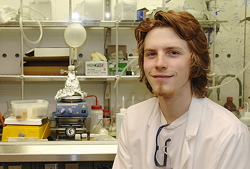Beckman Scholars among BU’s best and brightest undergraduate researchers
Program funds research in chemistry and biological sciences

Dan Bruggemeyer’s interests run the gamut, from watching an eclectic midnight movie at the Coolidge Corner Theater to viewing TV reruns of the science fiction show Quantum Leap to performing with the BU comedy troupe Slow Children at Play.
But Bruggemeyer (UNI’07), pictured above, doesn’t play around when it comes to his main interest: organic chemistry. “I have as much fun here in the lab as I do in sketch comedy,” he says, “but as far as the actual research is concerned, I’m all business.” Bruggemeyer is fascinated with organic chemistry “because its rules define the structure of all matter.” As one of three BU students chosen last spring as Beckman Scholars, he will be able to delve into the discipline he loves for three years, performing research part-time during two academic years and full-time over two summers.
The Arnold and Mabel Beckman Foundation’s Beckman Scholars Program provides scholarships to outstanding undergraduate researchers in chemistry and biological sciences. The scholarship, awarded to students at only 14 institutions nationwide, also enables the BU recipients to present their research at the annual Beckman Scholars Research Symposium in Irvine, Calif., and to participate in BU’s annual Undergraduate Research Symposium, hosted by the Undergraduate Research Opportunities Program, on Friday, October 14.
As a Beckman Scholar, Bruggemeyer works as a researcher in the lab of CAS Chemistry Professor John Porco, where he is working on the synthesis of the complex natural product 8-0-Methylsclerotorionamine. “Organic chemistry has so many practical applications, from drug development to plastics,” says Bruggemeyer, who plans to go on to graduate school and study organic chemistry, quantum mechanics, or endocrinology.
Fellow Beckman Scholar Beth Cimini (CAS’07) is involved in research with CAS Biology Professor William Eldred on signaling pathways in the retina and in discovering how the neurotransmitter acetylcholine is involved in the process of transforming light that shines into the human eye and develops into an image in the brain. “It’s an exciting area that hasn’t really been looked into that much,” she says, “so it’s very exciting and groundbreaking work.”
Roy Arjoon (ENG’07) is using the scholarship to investigate cell signaling in vascular smooth muscle cells (VSMCs) on bioengineered substrata. The laboratory of his faculty mentor, Joyce Wong, an ENG biomedical engineering assistant professor, uses these substrata in order to model the mechanical properties of healthy and diseased blood vessels. “As cardiovascular disease develops and progresses, one often finds that the vessels stiffen rather significantly,” says Arjoon. “We can mimic these changes in stiffness by varying constituent concentrations of the substrata. By doing this, we can effectively explore the effects of stiffness on cell signaling in VSMCs.” Such information, he says, is critical for understanding how to treat cardiovascular disease, because VSMCs are a major component of blood vessels. “Armed with an understanding of VSMC response to changes in substrate stiffness,” he says, “we aim to gain a deeper understanding into the mechanisms underlying cardiovascular disease.”